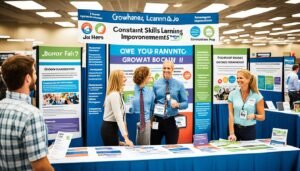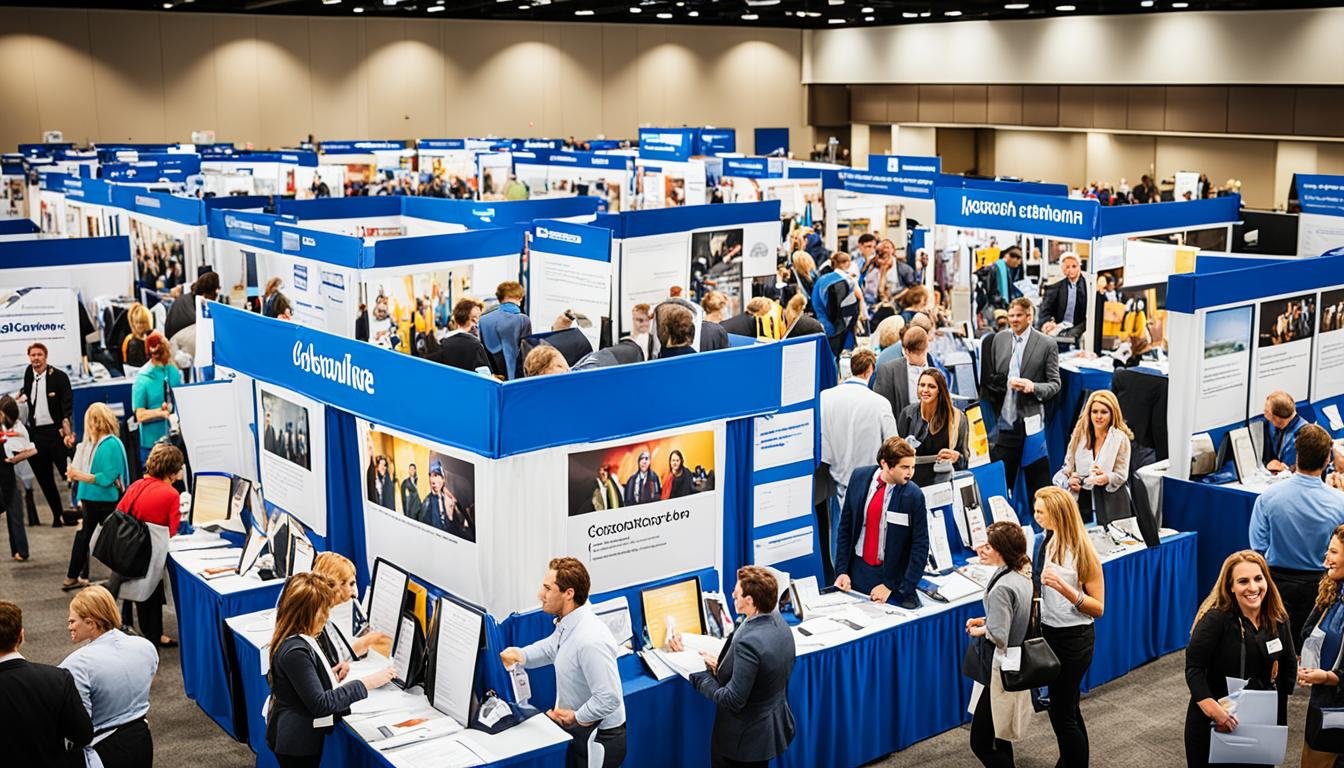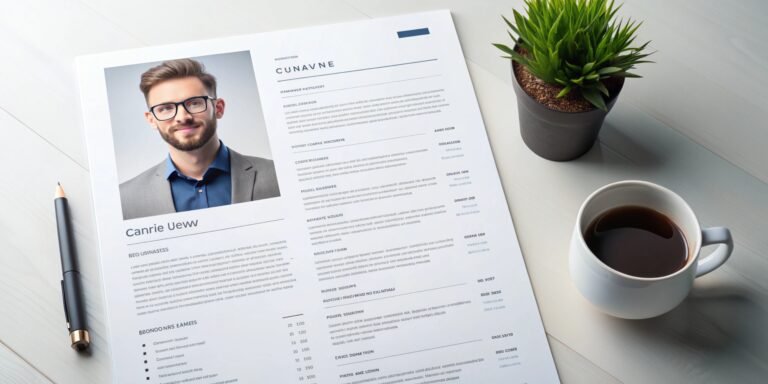Top 10 Job Fair Mistakes to Avoid (and How to Fix Them)
Are you preparing for a job fair, but apprehensive about potential errors that could jeopardize your prospects? You’re not the only one. Job fairs present a complex landscape for job seekers, requiring meticulous preparation1. Yet, with strategic planning and a proactive approach, you can excel and distinguish yourself as a prime candidate. This article delves into the top 10 errors to circumvent at job fairs and offers expert guidance on rectifying them.

Common blunders, such as inadequate employer research and neglecting post-event follow-up, can undermine your job fair endeavors. Recognizing these pitfalls and adopting the suggested strategies will enhance your chances of success and captivate potential employers2. Learn how to refine your resume, articulate a compelling elevator pitch, and leverage your time effectively at the job fair. Prepare to transform your next job fair into a pivotal career advancement opportunity!
Failing to Prepare Your Resume
At a job fair, your resume is the initial point of contact with potential employers. Recruiters frequently take the resumes they gather back to their offices for a thorough examination. Therefore, it is imperative that your resume not only stands out but also accurately mirrors your qualifications3.
Tailoring Your Resume
Adapting your resume to match the companies and roles you’ll be discussing is essential for success at job fairs. Research shows that individuals who bring tailored resumes, in multiple copies, significantly boost their chances of securing job offers by 60%3.
Using High-Quality Paper
Opting for professional paper stock for your resume can significantly enhance your initial impression on recruiters. It is well-documented that a well-organized, concise, and clean resume is vital when applying for a position. This is due to the high volume of resumes recruiters typically review4.
Including an Objective Statement
An objective statement in your resume can clearly articulate your career aspirations and suitability for the roles you desire. Studies indicate that pre-interview preparation by job seekers results in a 75% increase in securing job offers3.
| Resume Preparation Strategies | Increased Chances of Success |
|---|---|
| Bring multiple copies of tailored resumes | 60% increase in job offers3 |
| Practice introduction and interview preparation | 75% increase in securing job offers3 |
| Use high-quality, clean, and organized resume | Crucial for impressing recruiters4 |
“Preparing your resume in advance is crucial for job fair success. Customizing your resume to align with the companies and positions you’ll be discussing, using a professional paper stock, and including a concise objective statement can help you effectively communicate your fit and interest to recruiters.”
Not Having an Elevator Pitch
In the dynamic setting of job fairs, a meticulously crafted elevator pitch can significantly influence recruiters’ perceptions. This concise, engaging introduction should encapsulate your primary qualifications, skills, and career aspirations5.
Creating a potent elevator pitch is crucial for excelling at job fairs. Rather than awaiting questions, proactively articulate your background and elucidate why you’re the quintessential candidate for the roles on offer. Such a proactive stance showcases your readiness, assurance, and authentic interest in the entities you’re engaging with6.
Given the brisk pace of job fairs, it’s imperative to swiftly capture recruiters’ attention. A refined elevator pitch empowers you to steer the dialogue, delineate your self-promotion strategy, and demonstrate your suitability for the companies you’re addressing.
- Constrain your elevator pitch to a minute or less6.
- Rehearse with a confidant or kin prior to the virtual fair6.
- Customize your elevator pitch for diverse industries and positions6.
- Consistency is key in delivering an elevator pitch6.
- Ensure you have a business card or resume at the ready post-pitch6.
- Carry a link to your Handshake profile for virtual fairs6.
“An effective elevator pitch is indispensable for triumph at job fairs.”
Traditionally, job fair introductions were a passive affair, but the adoption of elevator pitches has surged in recent times5. This shift towards proactive self-promotion is now endorsed by career counselors and college career services5.
Not all aspirants employ elevator pitches, with some opting for a more understated approach5. Yet, for those aiming to leave a lasting impression, a meticulously constructed elevator pitch emerges as a pivotal asset in their employment quest56.
Lack of Research on Attending Companies
One of the primary pitfalls in job fair preparation is the underestimation of the importance of researching the companies in attendance7. It is essential to delve into the organizations, their offerings, and the roles they seek to fill. This knowledge enables more substantive dialogues with recruiters and aids in identifying suitable matches7.
Researching Company Information
Delving into the companies, their sectors, and the roles they are seeking to fill facilitates more dynamic, focused interactions with recruiters7. Such prior knowledge about a company’s position within its industry can markedly improve the caliber of your engagement with representatives at job fairs7.
Preparing Questions for Employers
Preparing astute questions is paramount for excelling at job fairs. Instead of merely inquiring about vacancies, delve deeper into the company culture, its growth prospects, and the attributes it values in candidates7. Engaging recruiters with well-informed queries and insights about their firm demonstrates a genuine interest and proactive approach7.
Job fairs offer a pivotal platform for connecting with employers, but such connections are contingent upon prior preparation7. Adequate preparation distinguishes a job seeker, presenting them as a well-versed, zealous candidate poised to contribute significantly7.
“Crafting compelling stories around identified skills can make a memorable impact during interactions at job fairs.”7
Through meticulous research on the companies attending and the formulation of insightful questions, one can significantly enhance their job fair experience, thereby boosting their prospects of leaving a profound impression on potential employers78.
Job Fair
Your appearance and demeanor at a job fair can significantly impact how potential employers perceive you9. To make a strong first impression, it’s crucial to dress in professional business attire, such as a suit or dress clothes9. Avoid overly casual or flashy outfits that could distract from your qualifications and capabilities9.
Dressing Appropriately
Job fairs are a prime opportunity to showcase your professionalism and fit for a company’s culture. By dressing in a neat, conservative manner, you can demonstrate your commitment to the job search process and your seriousness as a candidate. Recruiters often form quick judgments, so it’s important to embody the qualities they are seeking in potential hires.
Maintaining Professional Appearance
In addition to dressing appropriately, maintaining a professional appearance throughout the job fair is crucial10. This includes paying attention to your posture, avoiding fidgeting or nervous habits, and ensuring good hygiene and grooming10. Recruiters will be assessing not just your skills, but also your professionalism and fit for their company culture10.
“Dressing the part is essential for success at a job fair. Your appearance can make a lasting impression on potential employers.”
By focusing on your professional attire, job fair appearance, and overall grooming and hygiene, you can put your best foot forward and increase your chances of making a positive impression on employers. Attend the upcoming job fair and showcase your readiness to take on the next step in your career.
Failing to Follow Up
Many job seekers overlook the importance of post-job fair follow-up, a critical step in the recruitment process. It allows you to reiterate your interest, provide additional information, and keep your name in the employer’s mind11. Ensuring you collect business cards from recruiters you engage with is essential for maintaining contact11.
Collecting Business Cards
Requesting business cards from recruiters you connect with is beneficial for networking, though not all may comply11. Focusing on recruiters who exhibit genuine interest in engaging with job seekers can lead to more productive interactions11.
Sending Follow-Up Emails
Dispatching personalized follow-up emails within 24-48 hours post-job fair is a strategic move to stand out and showcase your enthusiasm12. These messages should include thanking the employer for their time, reaffirming your interest in the company and specific roles, and offering to provide any additional information required12.
Recruiters at career fairs often encounter numerous quality candidates, leading to a prolonged process of filling open roles or internship positions12. It is advisable to send your follow-up email within 24 hours of the event, as recruiters are overwhelmed with emails and may not have the time to engage with every candidate or follow up12. A well-structured follow-up email enhances your visibility with the recruiter, and personal connections mentioned can aid in their recall of you12.
When crafting a follow-up email, it is crucial to avoid casual greetings to maintain a professional tone. The tone of your message should reflect a professional and serious approach towards the job opportunity12. However, attaching your resume in a thank-you email is not always necessary12.
Post-job fair follow-up is vital for enhancing your chances of success. Collecting business cards from recruiters you connect with ensures you have their contact details for future reference. Subsequently, sending thoughtful follow-up emails that reiterate your qualifications, reignite the conversation, and reinforce your interest in the organization and potential opportunities is crucial.
Attending Without Clear Goals
Many job seekers err by attending job fairs without well-defined goals13. It’s essential to ponder your career ambitions, the roles you’re keen on, and your unique skills and qualifications beforehand. This strategic reflection aids in pinpointing the ideal companies to concentrate on and facilitates more substantive interactions with recruiters13.
Without clear objectives, the job fair’s vastness can be daunting13. Establishing specific goals, like the number of employers to connect with or the opportunities sought, keeps you focused and maximizes your time13. This method is more effective than aimlessly traversing the booths13.
Approaching a job fair without a defined purpose often results in frustration and inefficiency13. Dedicate time to discern your career goals, preferred job roles, and target industries beforehand14. Such preparation enables targeted discussions with recruiters, the acquisition of pertinent information, and the forging of connections that resonate with your professional ambitions13.
“Preparation is essential, including updating and customizing materials like resumes, cover letters, and portfolios.”13
Defining clear goals and objectives prior to a job fair enhances your time utilization and boosts your success prospects13. This strategic framework ensures focus, facilitates meaningful connections, and propels you towards your career objectives13.

A fruitful job fair experience hinges on setting attainable and aligned goals with your skills and expectations13. Evaluating your current situation and career aspirations before the event equips you to prepare adequately and leverage the networking opportunities at hand13.
- Identify your career goals and desired job functions13
- Research the participating companies and industries15
- Set specific and measurable goals for the job fair13
- Customize your resume, cover letter, and portfolio13
- Prepare thoughtful questions for potential employers14
- Be flexible and adaptable during the job fair13
- Evaluate your performance and learn from the experience13
With clear goals and a strategic approach, you can adeptly navigate the job fair, forge significant connections, and enhance your chances of securing the desired job13.
Lack of Confidence and Preparation
Job fairs can be formidable, yet, exuding confidence and thorough preparation can significantly enhance your visibility16. It is imperative to rehearse common interview queries beforehand, ensuring a seamless articulation of your background, skills, and the distinct value you bring to the table16. Furthermore, it is advisable to meticulously identify and accentuate your paramount strengths, which underscore your candidacy’s robustness16.
Practicing Interview Questions
Ensure you are well-versed in providing concrete examples that underscore your suitability and qualifications for the positions you covet16. This approach facilitates an effective communication of your unique value proposition16. The article cautions against inquiring about salary expectations, background checks, or information readily accessible to the public17. Instead, direct your inquiries towards aspects that showcase your comprehension of the company, its ethos, opportunities for growth, hiring protocols, requisite skills, training frameworks, and potential challenges within the role17.
Highlighting Your Strengths
Confidence and meticulous preparation are paramount for triumph at job fairs16. Engaging in the practice of potential interview questions and pinpointing your paramount strengths empowers you to engage in more impactful, memorable dialogues with potential employers16. Such preparation not only communicates your earnestness for the opportunities at hand but also underscores your potential to augment the organization’s dynamics16.
“Preparation before a job fair can aid in developing confidence which is a key aspect of success at such events.” – Lisa Quast, career coach for Forbes magazine
Forgetting to Network with Peers
While the primary focus of a job fair may be connecting with potential employers, savvy job seekers understand the immense value of networking with their fellow attendees. These individuals can provide insights into companies, roles, or job search strategies that could benefit, and you never know when one of these connections could lead to a future job referral or collaboration opportunity18.
Job fairs offer a unique chance to expand your professional network beyond just the recruiters in attendance. Take the time to introduce yourself to other job seekers, exchange contact information, and discuss your respective career goals and experiences19. These peer-to-peer connections can be just as valuable as the ones you make with employers18.
In the midst of navigating the bustling environment of a job fair, it’s easy to get tunnel vision and solely focus on speaking with company representatives. However, engaging with other job seekers can be a smart move. You may be able to learn from their strategies, swap insights, or even discover unadvertised job leads through these new connections20. Allocating some time to network with your peers can ultimately enhance your overall job fair experience and outcomes18.
| Networking Benefits | Statistics |
|---|---|
| Expands professional opportunities | 70-80% of jobs are found through networking20 |
| Leads to mutually beneficial relationships | 85% of jobs are filled through networking and relationships20 |
| Increases chance of being promoted | Individuals with a strong network are 34% more likely to be promoted within their organization20 |
| Provides job search advantages | 61% of professionals rank networking as the most effective job search strategy20 |
Don’t let the hustle and bustle of a job fair distract you from the immense value of networking with your peers. These connections can open doors, provide unique insights, and ultimately enhance your overall job search experience18. By dedicating time to building genuine relationships with fellow job seekers, you’re positioning yourself for greater long-term success20.
“Networking is not just about getting something from someone, it’s about building mutually beneficial relationships with people.” – Keith Ferrazzi, author of “Never Eat Alone”
Conclusion
Job fairs are pivotal for individuals aiming to connect with potential employers and elevate their career ambitions21. By heeding the advice on avoiding the top 10 mistakes discussed here, you can enhance your prospects at your next job fair21. Strategies such as crafting an exceptional resume, developing a compelling elevator pitch, and ensuring effective follow-up can significantly impact your interaction with recruiters. These approaches facilitate the creation of a memorable impression and aid in identifying suitable career paths.
Job fairs can be daunting, yet, with the correct mindset and preparation, they can yield substantial benefits22. It’s crucial to sidestep errors like inadequate company research, inappropriate attire, and overlooking follow-up22. Instead, emphasize showcasing your skills, posing thoughtful questions, and cultivating genuine connections22. Such actions will bolster your chances of landing interviews and advancing in the recruitment process.
Job fairs offer a unique chance to propel your job search forward, but it necessitates a strategic approach22. Avert the common pitfalls mentioned in this article and focus on refining your resume, promoting yourself confidently, and networking strategically21. With diligent preparation and execution, you can distinguish yourself from others and emerge as a standout candidate, garnering the attention of employers.
Source Links
- 23 College Job Fair Mistakes – https://www.creditdonkey.com/job-fair-mistakes.html
- Ask The Headhunter® – The Truth About Job Fairs – https://www.asktheheadhunter.com/10112/job-fairs
- 6 Tips To Prepare For A Career Fair Or Job Fair – https://www.linkedin.com/pulse/6-tips-prepare-career-fair-job-julia-parker
- Career Fairs are coming up…What do I do?? PART 1 – https://www.linkedin.com/pulse/career-fairs-coming-upwhat-do-i-part-1-rebecca-gill
- do job-seekers really need an elevator pitch? – https://www.askamanager.org/2015/10/do-job-seekers-really-need-an-elevator-pitch.html
- How to Prepare Your Virtual Career Fair “Elevator Pitch” – https://joinhandshake.com/blog/students/college-student-elevator-pitch/
- Job Fair Preparation Tips: The Importance of Research – https://www.employmentconnect.org/job-seeker-resources/research
- Do job fairs matter? Experimental evidence on the impact of job-fair attendance – https://www.ncbi.nlm.nih.gov/pmc/articles/PMC8550568/
- Upcoming Job Fairs | Virginia Employment Commission – https://www.vec.virginia.gov/job-fairs
- Attend a Virtual Job Fair – https://bhw.hrsa.gov/job-search/attend-virtual-job-fair
- The Do’s and Don’ts That Recruiters Wish You Knew About When Attending A Job Fair. – https://www.linkedin.com/pulse/dos-donts-recruiters-wish-you-knew-when-attending-job-starleeta-brown
- The Right Way to Follow-Up After a Career Fair – https://careerservices.fas.harvard.edu/blog/2023/10/20/the-right-way-to-follow-up-after-a-career-fair-2/
- How do you set realistic and achievable goals for a job fair? – https://www.linkedin.com/advice/3/how-do-you-set-realistic-achievable-goals-job-fair-skills-job-fairs
- Maximize Your Job Fair Success: Comprehensive Preparation Tips & Strategies – https://www.goodwilltalentbridge.com/blog/thrive-at-job-fairs-essential-preparation-tips-for-success
- What are the most effective goals for job seekers attending job fairs? – https://www.linkedin.com/advice/3/what-most-effective-goals-job-seekers-attending-gjccc
- 3 things to have in your job fair toolkit – https://beaconhillstaffing.com/resources/3-things-to-have-in-your-job-fair-toolkit
- 12 of the Best Questions to Ask at a Job Fair if You Want to Make a Great First Impression – https://www.topresume.com/career-advice/12-of-the-best-questions-to-ask-at-a-job-fair-if-you-want-to-make-a-great-first-impression
- I hate the idea of networking — it feels slimy – https://www.askamanager.org/2018/03/i-hate-the-idea-of-networking-it-feels-slimy.html
- How to network with professionals at career fair? – https://www.careervillage.org/questions/780896/how-to-network-with-professionals-at-career-fair
- is networking overrated? – https://www.askamanager.org/2022/02/is-networking-overrated.html
- Maximizing the Impact of Career Fairs for Students and Employers – https://www.linkedin.com/pulse/maximizing-impact-career-fairs-students-employers-rahul-lahoria
- Importance & Benefits of Career Fairs for Students with Reasons – https://www.optnation.com/blog/importance-benefits-of-career-fairs-for-graduates-students/







